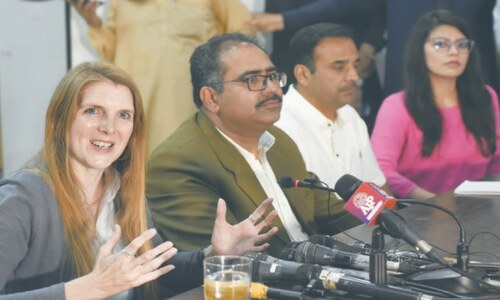ISLAMABAD: The seventh session of the Conference of the Parties to the WHO Framework Convention on Tobacco Control (FCTC), which concluded in India on Saturday, recommended strengthening Article 19 of the FCTC which fixes criminal liability on the tobacco industry in case of a disease or death of the tobacco user.
It claimed that tobacco would kill about one billion people in the 21st century. By 2030, over 80pc of the world’s tobacco-related mortality will be in the low and middle income countries. Moreover, the session also called for further research to get evidence about the consequences of the tobacco use among girls and women.
The seven-day conference was participated by delegations from 180 countries, UN agencies, NGOs and other stakeholders. The objective of the conference was to devise a strategy to reduce the influence of the tobacco industry in countries where political leadership is corrupt or corrupt-able as the tobacco industry has started influencing political decisions in developing countries. Another aim was to reduce the cultivation of the tobacco.
The head of The Network, Nadeem Iqbal, told Dawn that the conference was held at a very right time for Pakistan as the interference of the tobacco industry had been increasing in government policies.
Parties to WHO Framework Convention on Tobacco Control also suggest ways to reduce tobacco cultivation
“Though in the developed countries people have the right to sue companies if they face any side effect of the product, in developing countries such as Pakistan people cannot get justice. The tobacco industry will not be able to attract the youth if Article 19 of the FCTC, which is a UN convention against tobacco, is implemented in letter and spirit,” he said.
“In developed countries the implementation of laws is very strict so it does not matter if they don’t have very strict laws. There should be very strict laws in the developing countries such as Pakistan,” he said.
“Moreover, it can be said for sure that girls and women are affected more because of the use of tobacco but there is no authentic data about it. So there is a need to do further research to know the consequences of the tobacco use among girls and women,” he said.
A statement issued by the WHO claimed that several significant decisions were made during the intense week of discussions about the tobacco control within areas of development and human rights as well as public health.
“Without strong tobacco control measures, tobacco will kill about one billion people in the 21st century. By 2030, over 80pc of the world’s tobacco-related mortality will be in low and middle income countries.” The statement said the tobacco industry continuously attempted to affect the working of the conference and it was suggested that all the countries should remain vigilant of the industry’s efforts to undermine the implementation of the FCTC.
The head of the convention secretariat, Dr Vera Luiza da Costa e Silva, said the debate and planning produced a strong roadmap for global tobacco control in future.
“Despite all the hard work by the Parties, it is sad to see the interest, yet again, being promoted in the room. It is determined to undermine and distract us from our goal - to fight against the tobacco epidemic that not only damages health and kills people but also impoverishes those living in low to middle income countries,” she said.
As the tobacco industry uses the tobacco growers as a shield by making it an issue of their livelihood so it was suggested that steps should be taken to give economically sustainable alternatives to the growers.
“We have an obligation to protect vulnerable members of the tobacco production chain - the farmers. But we do that not through encouraging more growing as the tobacco industry does, but through the development of solid and sustainable alternatives that will promote a better future for farmers and their families,” Dr Costa said at the concluding ceremony.
It was also decided to address the gender specific risk while developing tobacco control strategies. It was recognised that the tobacco control was necessary to achieve the Sustainable Development Goals.
Nadeem Iqbal added that tunnel farming should be introduced for the tobacco growers to enable them to get two croups in one season and avoid any financial loss.
Published in Dawn, November 13th, 2016














































Dear visitor, the comments section is undergoing an overhaul and will return soon.